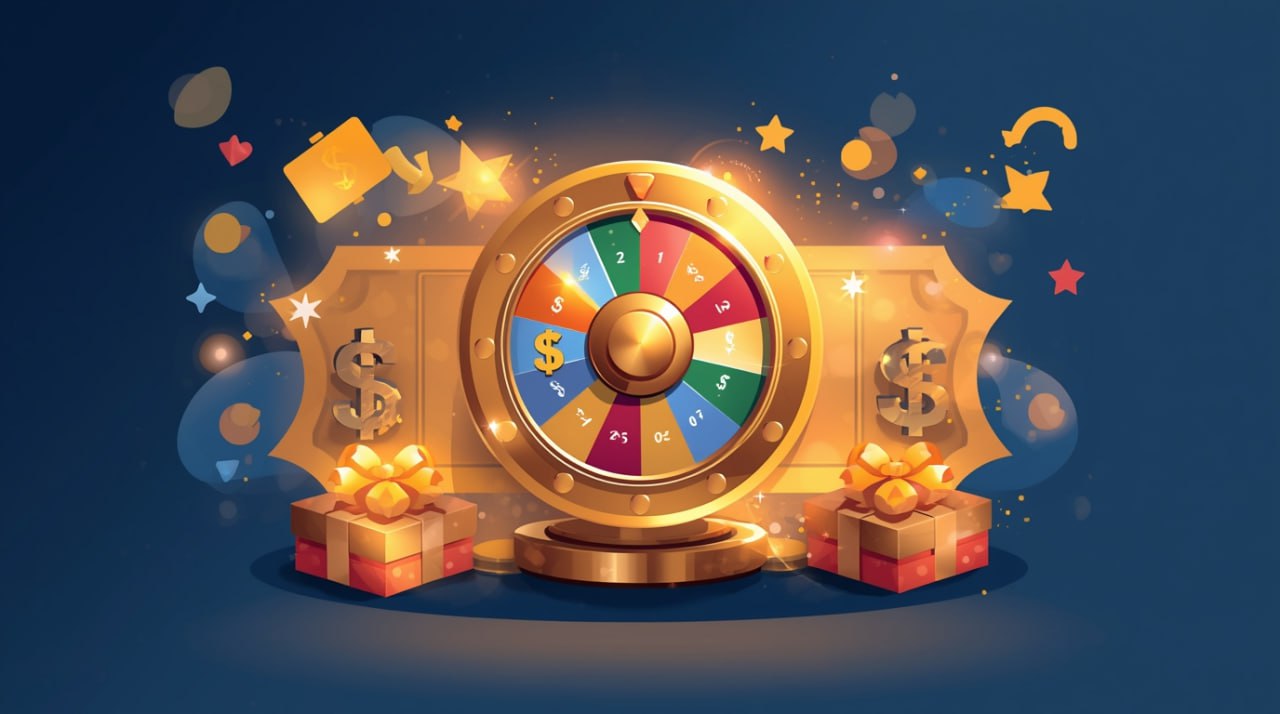What Is a Sweepstake?
A sweepstake (also spelled sweepstakes) is a type of contest where winners are chosen randomly from all the people who enter. Unlike competitions where you need skill to win, sweepstakes are pure luck. You simply enter your information, and if your name gets picked, you win a prize.
The word “sweepstake” comes from an old gambling term meaning “winner takes all.” Today, sweepstakes are used by companies for marketing, by charities for fundraising, and by organizations to generate excitement and engagement. The best part? Most sweepstakes are completely free to enter.
Sweepstakes have been around for decades, but they’ve exploded in popularity with the internet. What used to require mailing in postcards now takes just a few clicks. Millions of people enter sweepstakes daily, hoping to win everything from small prizes like gift cards to life-changing rewards like cars, vacations, or huge cash prizes.
How Sweepstakes Work

Understanding how sweepstakes work helps you enter confidently and avoid scams:
Entry Period: Every sweepstake has a specific time when you can enter. This might be a few days, several weeks, or even months. You must enter during this window for your entry to count.
Entry Methods: Most sweepstakes let you enter online by filling out a form with your name, email, address, and phone number. Some allow multiple entry methods like mail-in entries, social media actions, or daily entries.
Random Selection: When the entry period ends, the sponsor uses a random selection method to pick winners. This might be computer software, a random number generator, or physically drawing names from entries. The process must be truly random to be legal.
Winner Notification: Winners typically get notified by email, phone, or mail. You’ll need to respond within a certain time frame (usually 5-14 days) to claim your prize. If you don’t respond, they pick an alternate winner.
Prize Fulfillment: After verifying your eligibility and receiving necessary paperwork (like affidavits and tax forms), the sponsor sends your prize. This process can take 6-12 weeks depending on the prize.
Legal Requirements
Legitimate sweepstakes must follow specific laws:
- No Purchase Necessary: By law, sweepstakes cannot require you to buy something to enter. If you must purchase to enter, it’s technically a lottery, which only governments can run. Legitimate sweepstakes always offer a free entry method.
- Official Rules: Every sweepstake must publish clear, complete rules. These rules explain eligibility requirements, how to enter, prize details, odds of winning, and how winners are selected.
- Random Selection: Winners must be chosen randomly. Sponsors cannot pick winners based on favoritism or any criteria other than luck.
- Fair Play: The sponsor must actually award the prizes they advertise. Fake sweepstakes that never award prizes are illegal fraud.
Types of Sweepstakes
There are a few main types of sweepstakes.
Online Sweepstakes
These are the most common type today. You enter by visiting a website and filling out a form. Online sweepstakes are convenient, quick, and often allow daily entries.
Online sweepstakes offer instant entry from anywhere with internet access. They’re easy to track since you usually receive confirmation emails, and they often allow multiple entries over time. Unlike mail-in entries, there are no postage or printing costs, and you get immediate confirmation that your entry was received. You can find online sweepstakes on company websites where brands run promotions, on social media platforms like Facebook and Instagram, on sweepstakes aggregator sites that list current opportunities, and through email newsletters from your favorite brands.
Mail-In Sweepstakes
Traditional sweepstakes where you send a postcard or letter with your information. While less common now, some sweepstakes still accept or exclusively use mail entries.
Some people prefer mail entries because there are often fewer mail entries compared to online entries, giving you better odds. Some sweepstakes even offer better odds specifically for mail entries. Additionally, you don’t need to share your email address, and you can add a handwritten personal touch. Mail entries typically require a 3×5 inch postcard or paper in an envelope, and you must include all required information like your name, address, phone, and email. The entries must be mailed during the entry period with the postmark date being what matters. Remember that you can only send one entry per envelope, as multiple entries in one envelope will get you disqualified.
Social Media Sweepstakes
Companies run sweepstakes on Facebook, Instagram, Twitter, TikTok, and other platforms to increase engagement and followers. Common entry methods include liking a post, commenting on content, sharing or reposting to your followers, tagging friends in the comments, following the company’s account, or using specific hashtags they designate. It’s important to remember that social media sweepstakes must still follow sweepstake laws. Despite appearing casual and informal, they need official rules posted somewhere and cannot require purchase to enter.
Instant Win Games
These sweepstakes tell you immediately if you’ve won. You enter your information, click submit, and instantly see if you’re a winner. They work by using pre-determined winning times or entry numbers that are selected before the sweepstake even starts. A computer algorithm determines winners automatically, and games usually allow one entry per day or per person. They’re most popular for smaller prizes like gift cards, coupons, and small items. The appeal of instant win games is the immediate gratification of knowing right away if you won, the ability to enter daily for multiple chances, and the fun, game-like experience that makes entering entertaining rather than just filling out forms.
Sweepstake Casinos
A newer category that’s become very popular. Sweepstake casinos offer casino-style games like slots, poker, and blackjack, but operate under sweepstake laws rather than gambling licenses. You receive free “sweeps coins” to play with, and you can win prizes using these free coins. No purchase is required, though you can buy additional coins for entertainment purposes. These platforms are legal in most US states where real-money gambling isn’t permitted. Popular sweepstake casinos include Chumba Casino, Pulsz Casino, Fortune Coins, LuckyLand Slots, and Stake.us. These platforms appeal to people who enjoy casino games but live where online gambling is restricted.
If you’re interested in how online slots work in these sweepstake casinos, you can learn more about the role of RNG in online slots, which ensures fair and random outcomes in every game.
Common Sweepstake Prizes

| Prize Category | Examples | Typical Value |
|---|---|---|
| Cash | Money deposited directly, checks, PayPal | $25 – $1,000,000+ |
| Gift Cards | Amazon, Visa, retailer-specific cards | $10 – $500 |
| Electronics | TVs, phones, laptops, gaming consoles, cameras | $200 – $3,000 |
| Vehicles | Cars, trucks, motorcycles, boats | $15,000 – $100,000+ |
| Vacations | Travel packages, hotel stays, cruises, flights | $2,000 – $25,000 |
| Home Goods | Furniture, appliances, home improvement | $500 – $10,000 |
| Experiences | Concert tickets, sporting events, meet-and-greets | $500 – $5,000 |
| Products | Company products, prize packs, merchandise | $50 – $1,000 |
Cash Prizes
Cash is the most flexible prize. Winners can use it for anything they need. Cash sweepstakes range from small amounts like $25-$100 to life-changing sums of $100,000 or more. Publishers Clearing House famously awards multi-million dollar prizes. However, cash prizes are fully taxable as income. Winners receive a 1099 tax form and must report winnings on their tax returns. For prizes over $600, taxes are typically your responsibility to pay.
Gift Cards
Gift cards are extremely popular prizes because they’re valuable but cost sponsors less than cash. Amazon gift cards are most common since they offer huge product selection. Retailer-specific cards from places like Target, Walmart, and Starbucks are also frequent prizes. Gift cards work well as prizes because they’re easy for sponsors to award, almost as flexible as cash for winners, popular with people of all age groups, and available in many different denominations to fit various prize budgets.
Vehicles
Car sweepstakes generate massive interest. Who doesn’t dream of winning a brand new car? Vehicle sweepstakes often have hundreds of thousands or millions of entries. However, the reality of winning a car includes some challenges you should know about. You must pay taxes on the vehicle’s value, which can be anywhere from $5,000 to over $15,000 depending on the car. You’ll need to arrange transportation from wherever you claim it, which might mean traveling to another state. Insurance costs may be higher for expensive vehicles than what you currently pay. Because of these factors, some winners choose to sell the car immediately to get cash instead of keeping it.
Vacations
Trip prizes include flights, hotels, meals, and sometimes spending money. Destinations range from weekend getaways to exotic international locations. Vacation prizes typically include round-trip flights for two people, hotel accommodations for 3-7 nights, some meals or a daily spending allowance, travel insurance, and sometimes tours or activities at the destination. However, these prizes don’t include everything you might need. Passport and visa costs are your responsibility, along with additional spending money beyond what’s provided. The prizes are usually for two adults only, so trips for children aren’t included. You also can’t extend the trip for extra days beyond what the prize package covers.
How to Find Legitimate Sweepstakes

Trusted Sweepstake Websites
Several websites aggregate current sweepstakes, making it easier to find opportunities. Popular sweepstake listing sites include Sweepstakes Advantage, Contest Girl, Online Sweepstakes, The Balance Everyday (which has a dedicated sweepstakes section), and the Reddit r/sweepstakes community. These sites do the searching for you, listing current sweepstakes with entry deadlines, prize details, and direct links to entry forms so you don’t have to hunt around the internet.
Company Websites
Many companies run sweepstakes directly on their websites. Check the websites of brands you already like, including food and beverage companies, retailers and department stores, entertainment companies like movie studios and streaming services, automotive manufacturers, technology companies, and travel companies. Look for sections labeled “Promotions,” “Contests,” or “Sweepstakes,” which are usually found in the footer menu at the bottom of the homepage.
Social Media
Follow brands on social media platforms. Companies often announce sweepstakes exclusively to followers. Like company Facebook pages, follow them on Instagram, subscribe to their Twitter accounts, and join brand communities. Turn on notifications so you don’t miss time-sensitive opportunities that might only be open for a few hours or days.
Email Newsletters
Subscribe to newsletters from your favorite brands and retailers, sweepstake aggregator websites that send regular updates, and loyalty programs you participate in. Many sweepstakes are exclusive to email subscribers, meaning you won’t find them advertised anywhere else. Having a dedicated email address for sweepstakes keeps your main inbox clean and organized.
Tips for Winning More Sweepstakes
While luck determines winners, certain strategies improve your odds of winning:
Enter Regularly
The most important tip: enter often. Consistency matters more than anything else.
Why regular entry helps:
- More entries = better odds
- Many sweepstakes allow daily entries
- You won’t miss deadlines
- Builds a habit of watching for new opportunities
Dedicated sweepers (people who enter sweepstakes regularly) often set aside 30-60 minutes daily to enter multiple sweepstakes.
Focus on Smaller Sweepstakes
Everyone enters sweepstakes with million-dollar prizes. Fewer people enter sweepstakes for smaller prizes.
Strategy benefits:
- Better odds with fewer entries
- More chances to win something
- Small prizes add up over time
- Winning anything is exciting
A $100 gift card sweepstake with 5,000 entries gives better odds than a car sweepstake with 5 million entries.
Read the Rules Carefully
Understanding rules prevents disqualification and helps you maximize entries:
Key information in rules:
- How many times can you enter (once, daily, unlimited)?
- What entry methods are allowed?
- Eligibility requirements (age, location, employment restrictions)
- Prize details and value
- Winner notification method
- Entry period dates
Many people get disqualified for not following rules. Take 2-3 minutes to read them before entering.
Use Multiple Entry Methods
When sweepstakes offer different entry methods, use all of them:
- Online entry form
- Mail-in entry
- Text message entry
- Social media actions
Each method usually counts as a separate entry, multiplying your chances.
Create a Dedicated Email Address
Use a separate email address just for sweepstakes. This strategy offers several benefits:
- Keeps sweepstake emails separate from personal/work email
- Easier to track entries and winner notifications
- Prevents missing winner notifications in crowded inbox
- Protects your primary email from potential spam
Check this email at least daily to catch winner notifications before deadlines expire.
Keep Records
Track which sweepstakes you’ve entered:
- Sweepstake name and sponsor
- Entry date
- End date
- Prize details
- Whether daily entries are allowed
This prevents duplicate entries when not allowed and reminds you to enter daily when permitted. A simple spreadsheet works perfectly.
Be Patient
Winning takes time and persistence. Most serious sweepers enter for months before their first win. Don’t get discouraged:
- Some people win nothing for a year, then win multiple prizes
- Odds are against any single entry, but improve with volume
- Small wins happen more frequently than big wins
- The hobby is free, so there’s no financial loss
Red Flags: How to Spot Sweepstake Scams
Unfortunately, scammers exploit people’s excitement about winning. Learn to recognize fraud:
Warning Signs of Scams
“You’ve won!” notifications you didn’t expect:
- Real winners are notified by the method stated in official rules
- Unsolicited winner notifications are usually scams
- Legitimate sponsors don’t notify via random text messages or calls
Requests for money:
- “Pay taxes/fees/shipping before receiving prize”
- “Processing fee required”
- “Insurance payment needed”
- Real sweepstakes NEVER require payment to receive prizes
- Winners pay taxes directly to government, not sponsors
Pressure to act immediately:
- “Claim your prize in the next hour or lose it!”
- “Respond now or we’ll pick another winner!”
- Legitimate sponsors give reasonable time to respond (usually 5-14 days)
Requests for sensitive information:
- Social Security number (never needed to enter)
- Credit card or bank account numbers
- Passwords or security codes
- Real sponsors only need basic contact information
Poor grammar and spelling:
- Professional companies use proper English
- Official notifications are well-written and formatted
- Typos and errors indicate scam attempts
Suspicious email addresses or websites:
- Email from free services (gmail, yahoo) instead of company domains
- Website URLs that misspell the company name
- No official rules or company information on website
How to Verify You Actually Won
If you receive a winner notification that seems legitimate:
- Check your sweepstake records – Did you actually enter this specific sweepstake?
- Review the official rules – How did they say winners would be notified?
- Visit the company’s official website – Look for winner announcements or contact information to verify
- Call the company directly – Use phone numbers from official website, not from the notification
- Google the sweepstake name plus “scam” – See if others report it as fraudulent
- Trust your instincts – If something feels wrong, it probably is
What to Do If You Encounter a Scam
If you identify a sweepstake scam:
- Don’t respond or engage – Ignore the communication completely
- Don’t click links or download attachments – They may contain malware
- Report it – Federal Trade Commission (FTC.gov) handles fraud reports
- Warn others – Post about it on sweepstake forums or social media
- Block the sender – Prevent future contact
Never feel embarrassed about nearly falling for a scam. Scammers are sophisticated and constantly evolving their tactics.
Understanding Sweepstake Odds

How Odds Are Calculated
Odds represent your chance of winning. They’re calculated as:
Odds = 1 / (Total Number of Entries)
For example, if there are 10,000 total entries, your odds are 1 in 10,000 (which is a 0.01% chance). With 1,000 total entries, your odds improve to 1 in 1,000 (0.1% chance). And with just 100 total entries, you’d have 1 in 100 odds (1% chance). Understanding these numbers helps you choose which sweepstakes to enter based on realistic winning potential. Some sweepstake platforms use sophisticated systems similar to how online casino games determine outcomes, ensuring completely random and fair winner selection.
Factors Affecting Your Odds
| Factor | Impact on Odds |
|---|---|
| Prize Value | Higher value prizes attract more entries (worse odds) |
| Entry Requirements | Complex requirements reduce entries (better odds) |
| Promotion Level | Heavily advertised sweepstakes get more entries (worse odds) |
| Entry Period Length | Longer periods accumulate more entries (worse odds) |
| Entry Frequency | Daily entry allowed = more chances for dedicated entrants |
| Platform | Social media sweepstakes often have more entries than website-only |
| Geographic Restrictions | Limited to one state/region = fewer eligible entries (better odds) |
| Sponsor Recognition | Unknown companies get fewer entries (better odds) |
Improving Your Personal Odds
While you can’t control total entries, you can maximize your chances:
Multiple entries when allowed:
- Enter daily if rules permit
- Use all available entry methods
- Refer friends if referral entries are offered
Strategic selection:
- Target sweepstakes with fewer expected entries
- Enter regional/local sweepstakes instead of national
- Focus on niche interests (fewer people interested)
Volume approach:
- Enter many sweepstakes instead of just one
- Quantity increases likelihood of eventually winning
Tax Implications of Winning
Understanding Prize Taxes
Many people don’t realize prizes are taxable income. The IRS considers sweepstake winnings as “other income.” When you win prizes valued at $600 or more, you’re required to report them for tax purposes. You’ll receive IRS Form 1099-MISC from the sponsor, and you must report these winnings on your tax return. The taxes you owe are calculated based on the prize’s fair market value, not what you might think it’s worth.
The tax rates on sweepstake prizes follow your ordinary income tax rate, which could range anywhere from 10% to 37% depending on your total income for the year. State taxes may also apply on top of federal taxes, making your total tax burden even higher. For example, imagine you win a $30,000 car and you’re in the 22% federal tax bracket. You would owe $6,600 in federal taxes, plus possible state taxes ranging from $1,500 to $3,000, bringing your total tax obligation to somewhere between $8,100 and $9,600 due when you file your taxes. This is money you need to pay out of pocket since the prize itself is the car, not cash.
Strategies for Managing Prize Taxes
Managing the tax burden from sweepstake prizes requires planning and smart decisions. For cash prizes, the strategy is straightforward: set aside the tax amount immediately when you receive the money. Don’t spend the full amount thinking you’ll deal with taxes later. Calculate roughly what you’ll owe based on your tax bracket and put that money in a separate account.
For non-cash prizes like cars, vacations, or electronics, the situation is more complex. Many winners choose to sell the prize immediately to cover the taxes and pocket the difference. Some winners decline prizes altogether if they can’t afford to keep them, which is completely acceptable and sometimes the smartest financial decision. You can also try negotiating with the sponsor to receive a cash equivalent instead of the physical prize, which makes paying taxes much easier.
Good record keeping is essential when dealing with prize taxes. Save all winner notifications and correspondence from the sponsor, keep copies of all 1099 forms you receive, and document the prize value if it’s not clearly stated in the official paperwork. These records protect you if questions arise during tax filing.
For large prizes, professional help is worth the investment. Consult a tax professional who can help you minimize your tax burden legally through deductions and proper reporting. The cost of hiring a tax advisor is definitely worth it for prizes valued over $10,000, as they can often save you more money than they cost.
Special Types of Sweepstakes

Instant Win Games
These games provide immediate results. You don’t wait for a drawing—you know instantly if you’ve won.
How they’re programmed:
- Winning times are pre-selected before the sweepstake starts
- Or every Nth entry wins (example: entries 100, 200, 300 win)
- Computer determines winners using random algorithms
- When you enter at a winning time/position, you win
Benefits of instant win:
- Immediate gratification
- Usually allow daily play
- Often award many smaller prizes
- Fun gaming experience
Second-Chance Drawings
Many lotteries and sweepstakes offer second-chance drawings for non-winning entries. Your original non-winning entry gets entered into an additional drawing, providing another chance to win. These often have better odds because fewer people take the time to enter second-chance drawings compared to the original contest. For example, a state lottery might let you enter non-winning scratch-off tickets into monthly drawings for cash or prizes. If you’re interested in exploring more lottery opportunities, check out information about crypto lottery types which offer modern alternatives to traditional lotteries.
Referral Sweepstakes
These give you additional entries for referring friends.
Typical structure:
- You get a unique referral link
- Each friend who enters using your link earns you bonus entries
- More referrals = more chances to win
Strategy:
- Share on social media
- Email friends and family
- Join sweepstake communities where people share referral links
Skill-Based Contests vs. Sweepstakes
Important distinction: Not all contests are sweepstakes.
Sweepstakes:
- Winner chosen randomly
- No skill required
- Free to enter by law
Contests:
- Winner chosen based on skill/merit
- Examples: photo contests, essay contests, recipe competitions
- Can legally require purchase
- Judges evaluate entries
Many promotions are actually contests, not sweepstakes. Read rules to understand which type you’re entering.
Building a Winning Strategy
Time Investment
Successful sweepers invest time strategically. Beginners typically spend 15-30 minutes daily entering 5-10 sweepstakes, focusing on ones with the best odds while learning the basics. Intermediate sweepers dedicate 30-60 minutes daily to enter 15-25 sweepstakes, mixing both large and small prizes while tracking entries in a spreadsheet. Serious sweepers invest 1-2 hours daily entering 30-50 or more sweepstakes, making daily entries on all eligible sweepstakes, and staying active in sweepstake communities. Some serious sweepers treat it like a part-time job, maximizing their chances through volume and dedication.
Related reading: If you’re interested in other ways technology and gaming intersect, explore topics like casino game development or lottery platform development to understand the technical side of these systems.
Organization Systems
Staying organized helps you enter efficiently and never miss notifications:
Spreadsheet tracking:
- Columns: Name, Sponsor, Entry Date, End Date, Daily?, Prize, Status
- Update when entering and when notified
- Sort by end date to prioritize
Email folders:
- “Entered” folder for confirmation emails
- “Active” folder for daily entries
- “Winners” folder for wins
- Auto-rules to sort incoming emails
Browser bookmarks:
- Folder for daily entry sweepstakes
- Folder for new opportunities
- Makes entering quick and easy
Calendar reminders:
- Mark end dates
- Remind yourself of daily entries
- Note when winner announcements happen
Community Involvement
Joining sweepstake communities provides benefits:
What you gain:
- Notifications of new sweepstakes
- Tips from experienced winners
- Warning about scams
- Motivation and support
- Celebration of wins
Where to find communities:
- Reddit r/sweepstakes
- Facebook sweepstake groups
- Online forums dedicated to sweeping
- Twitter hashtags like #sweepstakes
Real Stories: What People Actually Win
Understanding what real people win helps set realistic expectations:
Small Wins (Most Common)
- Gift cards ($5-$100)
- Product samples
- Coupons and discounts
- Company merchandise
- Small electronics (headphones, speakers)
Most winners experience small wins. These happen more frequently and provide regular positive reinforcement.
Medium Wins (Occasional)
- Gift cards ($100-$500)
- Electronics (tablets, game consoles)
- Appliances (coffee makers, air fryers)
- Restaurant gift certificates
- Entertainment packages
These wins happen less frequently but feel significant. They’re large enough to make a real difference in your life.
Large Wins (Rare)
- Vehicles
- Vacations
- Cash ($1,000+)
- Major electronics (TVs, laptops)
- Home renovations
Big wins are rare but possible. People do win them regularly, just not the same people over and over. These life-changing prizes get media attention and inspire others to keep entering.
Reality Check
Most sweepers report winning something small within their first few months of consistent entering. Large prizes take longer—sometimes years of entering before hitting a big win. The key is managing expectations while staying persistent.
Common Questions About Sweepstakes
Can the same person win multiple times?
Yes! There’s no limit to how many sweepstakes one person can win. Some people win multiple times per year. Each sweepstake is independent—winning once doesn’t reduce your odds in other sweepstakes.
However, individual sweepstakes might limit winners to one prize per household per year. Check the official rules.
Do I have to accept a prize I won?
No. You can decline any prize. This might make sense if:
- The tax burden is too high
- You can’t use the prize
- Claiming it requires travel/expense
- You don’t want the sponsor to have your information
When you decline, the sponsor picks an alternate winner.
Can I win if I enter once vs. daily?
Mathematically, more entries increase your odds. But yes, someone who enters once can win. The drawing is random—your first entry has the same chance as your hundredth entry.
That said, people who enter daily accumulate far more entries over time, significantly improving their overall chances.
Are sweepstakes gambling?
No. Gambling requires three elements: prize, chance, and consideration (payment). Sweepstakes have prize and chance, but legitimate sweepstakes cannot require payment. This legal distinction makes sweepstakes different from gambling.
How long does it take to receive prizes?
Typical timeline:
- Winner notification: Immediately to 90 days after end date
- Prize fulfillment: 6-12 weeks after verification
- Some prizes arrive in 2-3 weeks, others take months
Be patient. Legitimate sponsors take time to verify winners, handle paperwork, and ship prizes.
Conclusion
Sweepstakes offer legitimate opportunities to win prizes without spending money. While luck determines winners, strategies like entering regularly, reading rules carefully, and focusing on smaller sweepstakes improve your chances.
The key to success in sweepstakes is consistency and realistic expectations. You probably won’t win a million dollars, but you can absolutely win gift cards, products, and occasionally bigger prizes. Many dedicated sweepers report winning thousands of dollars in prizes annually.
Remember the fundamentals:
- Enter regularly for best results
- Always read official rules
- Never pay to enter or claim prizes
- Watch for scam warning signs
- Track your entries
- Be patient and persistent
- Report winnings on taxes
- Have fun with it!
Sweepstakes are a free hobby that anyone can enjoy. Whether you enter occasionally for fun or dedicate serious time hoping for big wins, the thrill of possibility makes it exciting. With the knowledge from this guide, you’re ready to enter sweepstakes confidently and safely.
Ready to start entering? Search for “sweepstakes” on trusted aggregator sites, read the official rules, and submit your first entry today. Good luck, and may the odds be in your favor!







